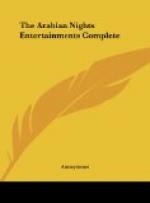“I am,” said the second sharper, “a genealogist of horses.” “And I,” continued the third, “a genealogist of mankind, knowing every one’s true descent; an art much more wonderful than that of either of my companions, for no one possesses it but myself, nor ever did before me.” The sultan was astonished, but gave little credit to their pretensions: yet he said to himself, “If these men speak truth, they are worthy of encouragement. I will keep them near me till I have occasion to try them; when, if they prove their abilities, I will promote them; but if not, I will put them to death.” He then allotted them an apartment, with an allowance of three cakes of bread and a mess of pottage daily; but placed spies over them, fearing lest they might escape.
Not long after this, a present of rarities was brought to the sultan, among which were two precious stones; one of them remarkably clear in its water, and the other with a flaw. The sultan now bethought himself of the lapidary, and sent for him to his presence, when he gave him the clear jewel to examine, and demanded what he thought it was worth.
The sharper took the stone, and with much gravity turned it backwards and forwards in his hands, examining it with minute attention on every part; after which he said, “My lord, this jewel has a flaw in the very centre of it.” When the sultan heard this, he was enraged against the sharper, and gave orders to strike off his head; saying, “This stone is free from blemish, and yet thou pretendest it hath a flaw.” The executioner now advanced, laid hold of the sharper, bound him, and was going to strike, when the vizier entered, and seeing the sultan enraged, and the sharper under the cimeter, inquired the cause. Being informed, he advanced towards the sultan, and said, “My lord, act not thus, but first break the stone: should a flaw appear in it, the words of this man are true; but if it be found free from blemish, put him to death.” The sultan replied, “Thy advice is just:” and broke it in two with his mace. In the middle he found a flaw, at which he was astonished, and exclaimed to the sharper, “By what means couldst thou discover the blemish?” He replied, “By the acuteness of my sight.” The sultan then released him, and said, “Take him back to his companions, allow him a mess of pottage to himself, and two cakes of bread.”
Some time after this a tribute came from one of the provinces, part of which consisted of a beautiful black colt, in colour resembling the hue of the darkest night. The sultan was delighted with the animal, and spent whole days in admiring him. At length he bethought himself of the sharper who had pretended to be a genealogist of horses, and commanded him to his presence. When he appeared, the sultan said, “Art thou a judge of horses?” He replied, “Yes, my lord: “upon which the sultan exclaimed,” It is well! but I swear by him who appointed me guardian of his subjects, and said to the universe, Be! and it was, that should I find untruth in thy declaration, I will strike off thy head.” The man replied, “To hear is to submit.” After this they brought out the colt, that he might examine him.




